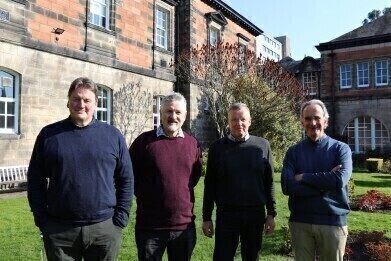-
 Pic l to r: Profs David Gray and Angus Lamond (both Dundee), Michael Sattler (Helmholtz Munich) and Juan Valcárcel (Center for Genomic Regulation, Barcelona)
Pic l to r: Profs David Gray and Angus Lamond (both Dundee), Michael Sattler (Helmholtz Munich) and Juan Valcárcel (Center for Genomic Regulation, Barcelona)
News
Gene Editing Project to Bolster Therapies Development
Jul 31 2023
A joint study to explore how genes can be edited to develop new drugs for cancer, neurodegeneration and other diseases being conducted in the UK by researchers in Dundee, was awarded £4.4 million funding from UK Research and Innovation (UKRI), with European collaborators from Germany and Spain receiving matched funding from the European Council (ERC).
Professors David Gray and Angus Lamond from Dundee University’s School of Life Sciences, will work alongside their colleagues from Helmholtz Munich and the Center for Genomic Regulation, Barcelona, on the UNLEASH project, which aims to produce drug-like small molecules that can control a process called alternative splicing (AS) known to play a key role in disease development.
Alternative splicing enables the production of different messenger RNAs and proteins from a single gene and the aim of the project is for the scientists to learn how to manipulate this process accurately. This will create opportunities to control how genes function and contribute to disease mechanisms, helping pharmaceutical companies to develop novel therapeutic approaches for treating human diseases.
Professor Lamond said an analogy could be made with the more familiar process of video editing : “The gene can be seen as the raw video footage that is captured, while the mRNA product that delivers the instructions for proteins is like edited video footage, where the editor has removed – spliced out – unwanted regions to form the final video story.
“Just as a skilled video editor can edit their raw footage in different ways to create more than one alternative video sequence, so too can human genes be edited differently, thus creating alternative final mRNA products that code for different types of proteins.
“AS holds the key to understanding how our genes function and for the development of new therapeutics for a host of human diseases, many of which are known to alter the splicing process.”
The importance of mRNA molecules and how to engineer them was demonstrated by Covid-19 vaccines, while the potential of this approach has been illustrated by the development of the first drugs for the childhood genetic disorder Spinal Muscular Atrophy.
For most genes to instruct the cell how to build proteins, DNA must first be copied into a related molecule known as RNA. Regions which are not essential for coding are spliced out to create mRNA, which assembles the information required to produce specific proteins.
UNLEASH combines complementary expertise in chemical, structural, molecular, cellular and systems biology and Artificial Intelligence to be found at Dundee, the Helmholtz Center in Munich, and Barcelona’s Center for Genomic Regulation.
Professor Gray said, “In principle, there are a wide array of cancers and neurodegenerative diseases we can treat if we can understand how to manipulate alternative splicing events. We know that alternative splicing is highly relevant to disease, but there is a knowledge gap that must be addressed if we are to develop these drugs.
“The project will generate many new compounds that will be useful for studying gene function and provide valuable new information to aid the rational design of small molecules targeting alternative splicing. It is hoped that this can lead to the development of new types of therapeutics for treating human diseases of current unmet need.”
More information online
Digital Edition
Lab Asia Dec 2025
December 2025
Chromatography Articles- Cutting-edge sample preparation tools help laboratories to stay ahead of the curveMass Spectrometry & Spectroscopy Articles- Unlocking the complexity of metabolomics: Pushi...
View all digital editions
Events
Jan 21 2026 Tokyo, Japan
Jan 28 2026 Tokyo, Japan
Jan 29 2026 New Delhi, India
Feb 07 2026 Boston, MA, USA
Asia Pharma Expo/Asia Lab Expo
Feb 12 2026 Dhaka, Bangladesh


















